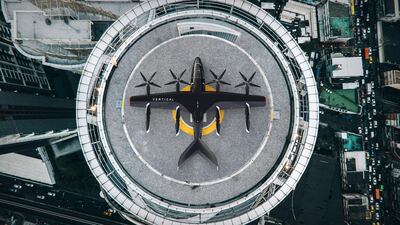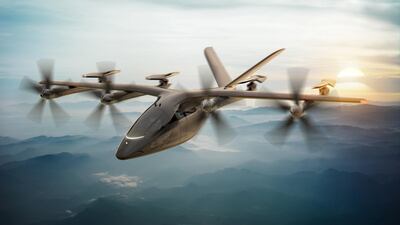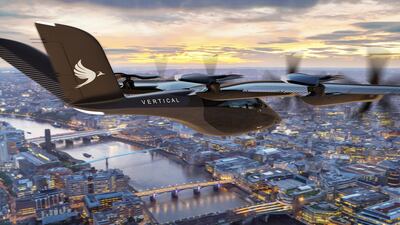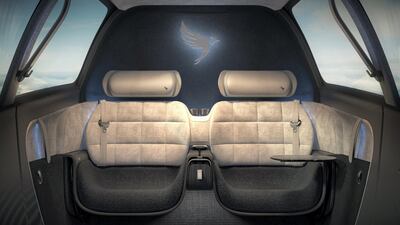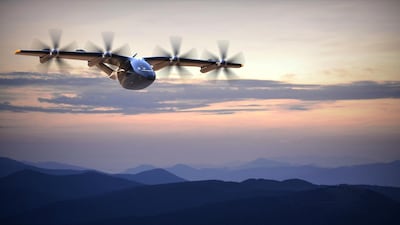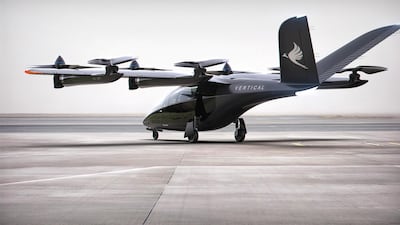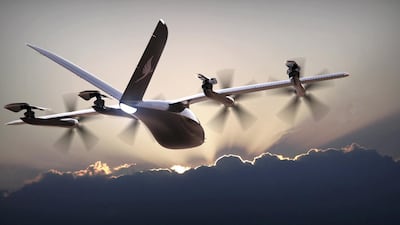Electric flying taxis jetted a little closer to reality after British entrepreneur Stephen Fitzpatrick unveiled plans to list his start-up Vertical Aerospace on the New York Stock Exchange with an equity value of $2.2 billion.
Bristol-based Vertical Aerospace, which designs and builds electric aircraft that are “near silent”, can reach speeds of more than 300kph and have zero emissions, plans to go public in the second half of this year thanks to special purpose acquisition company (Spac) merger.
Serial entrepreneur Mr Fitzpatrick, who also founded energy company Ovo Group, said the aircraft would take to the skies in 2024, with the listing coming “at the most exciting time in aviation for almost a century”.
“Electrification will transform flying in the 21st century in the same way the jet engine did 70 years ago,” he said.
“The UK is already a global leader in aerospace innovation and we believe Vertical Aerospace will be the British engineering champion to drive the aviation industry forward."
Flying taxis known as Vertical Take-off and Landing aircraft (eVOTLs) are gaining traction across the globe as a flurry of companies enter the race to create low-emission travel over short distances.
Designed to accommodate only a few passengers, the aircraft are ideal for wealthy commuters in congested urban areas or people planning a weekend getaway.
Similar to an electrified helicopter, the planes take off and land vertically but they are quiet, agile and emission-free as they use small electric rotors.
Mr Fitzpatrick's VA-X4 aircraft can travel up to 160 kilometres and will produce zero emissions "at low cost per passenger mile", a major boon for the airline industry, which is under pressure over carbon emissions.
The popularity of Spacs is helping to propel the budding sector on to the world stage, with Vertical Aerospace going public through a reverse merger with Broadstone Acquisition, co-founded by fellow Briton, Pizza Express entrepreneur Hugh Osmond.
The deal will value the combined companies’ equity at about $2.2bn and raise $394 million to hire new staff and build manufacturing plants.
“Vertical has a clear commercial plan to challenge short-haul air travel and to create new markets where neither cars nor public transport can cope with demand,” Mr Osmond said.
He commended the company’s “clear business model to achieve commercialisation and significant growth”, with Vertical Aerospace claiming it can reach profit and cash flow break-even with sales of fewer than 100 aircraft.
The Spac raised money through a private placement from investors including 40 North, an affiliate of Microsoft, American Airlines, Avolon, Rolls-Royce Holdings and Honeywell International.
Mr Fitzpatrick said the deal brought together “some of the largest and most respected technology and aeronautical businesses in the world” who together could help the VA-X4 become “the first zero-carbon aircraft that most people will fly on”.
Vertical Aerospace said it already had about 1,000 orders, worth $4bn, with American Airlines, Virgin Atlantic and Avolon investing in the company and booking aircraft.
While American agreed to buy 250 aircraft, subject to conditions, aircraft lessor Avolon booked 310 aircraft with an option to acquire another 190.
Richard Branson's Virgin Atlantic signed an option to place orders of the aircraft with plans to fly passengers into major British airports such as Heathrow, Gatwick and Manchester.
The airline said passengers could see a 90km journey from Cambridge to Heathrow, for example, reduced to just 22 minutes.
With the aviation sector meeting resistance to longer trips for climate reasons as well as the effects of the pandemic, eVTOLs offer potential for a new business more tied to local movement.
“We believe that this is the beginning of the next big evolution of urban air mobility,” said Domhnal Slattery, chief executive of Avolon Holdings, which is investing $15m in Vertical Aerospace. “This is probably as significant as the jet age.”
While unmanned test flights of the VA-X4 will begin later this year, piloted versions will take place afterwards with eVTOL manufacturers looking to transition to pilotless aircraft.
Mr Fitzpatrick’s decision to opt for a US Spac listing rather than floating the company in London will be a blow to Chancellor of the Exchequer Rishi Sunak’s ambitions to make the City of London a tech fundraising hub, the entrepreneur said he had no choice because the UK markets “don’t really support this kind of business at the moment”.
Mr Fitzpatrick said his model would be certified to the same standards as large commercial airliners, making it “safer than a helicopter”, with the company planning to certify it to EU Aviation Safety Agency standards, which it considers “the most stringent”.
Patrick Ky, executive director of EASA, last month said he expected commercial use of eVTOLs to begin with carrying cargo before passengers.
Unmanned flight would take at least another five years, Mr Ky said, as EASA works on a co-ordinated approach with the US Federal Aviation Administration and other international regulators.
